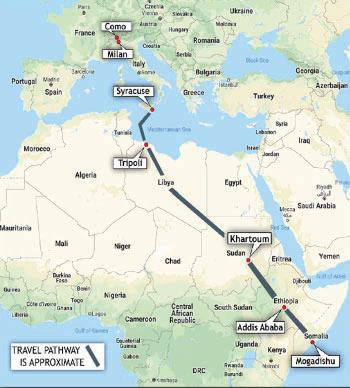
3 minute read
STORIES OF YOUNG AFRICAN REFUGEES’ TREK TO ITALY

Como is more than a picture-perfect northern Italian town on the banks of the famed Lake Como, with brilliant views of the Alps, quaint piazzas, and magnificent villas. It is also a safe haven for thousands of young refugees who have fled their homes in Africa and other countries in pursuit of a better life.
Advertisement
When Al-Shabaab killed his brother, Imam knew he was next. He escaped his home in Somalia and began a traumatic two-year trek to Italy. Along the way, he was beaten, sexually abused and starved. Today, this resilient 18-year-old works at a printing shop in Como.
Faith was 20 when she left Nigeria in hopes of a brighter future in Europe. During her year-long journey, she was held by a man who repeatedly sold her for sex. Somehow, she made it out and arrived in Como, where she developed the skills she needed to land a job in housekeeping.
When Favor was 15, her step-mother gave her in marriage to an older man. When Favor refused, she was locked in a room for three days with no food or water. Favor’s sister helped her escape, and together they undertook a dangerous three-year trip to Italy. Now Favor is in Como, learning Italian and gaining job skills.
These are just three of the harrowing but hope-filled stories collected by Terry Koenig, Ph.D., LSCSW, professor in the KU School of Social Welfare, as part of “The Long Road Out of Africa: Inclusion and Identity in Como, Italy.” Koenig’s digital storytelling project chronicles the experiences of refugees served by Cometa, a foster care agency in Como that also provides vocational training to an increasing number of African refugees.
Between January and October of 2021, 53,700 such refugees arrived in Italy by sea, more than 7,000 of whom were unaccompanied minors, according to Statista, 2021. These refugees face many barriers to employment, including low basic and technical skills, lack of awareness of the job culture, and no links to recruitment networks. They also experience racism, cumbersome bureaucracy and unmet psychological needs. As a result, 45 percent of the refugees between 18 and 24 years of age drop out of vocational training programs in Italy
As part of her project, Koenig is working to see these drop-out rates decrease by equipping agencies with the data they need to better assist refugees in finding and sustaining employment, while integrating their African identities into their new Italian communities.
“This work has implications for refugees across the world,” Koenig says. “The refugee story is only a growing human phenomenon. The social work profession is going to have a role to play in integrating these folks.”
In 2019, she conducted semi-structured interviews with 17 young African refugees and 10 staff members in Cometa’s vocational training program. She and her team have just concluded analyzing the data and have uncovered several telling patterns she believes agencies can use to improve the efficacy of their work with refugees.
For example, although most of the refugees suffered traumatic experiences during their journey, including sex trafficking, imprisonment, beatings and enslavement, their individual experiences were not fully considered as part of the training at Cometa. The data also revealed that for participants to thrive in the program, it is important to provide them with language skills and social support, plus identify the barriers they face in finding a job and the social exclusion they encounter.
“The kids are resilient,” Koenig says. “These are horrific experiences they’ve had – many people died along the journey – but these kids survived and are now giving back to Italian society.”
Fueled by a KU Digital Humanities Fellowship, Koenig is also developing an interactive website that uses photos and stories to chronicle the refugees’ journeys from their homes in Africa to Como. She has also received support from the KU Center for African Studies and the KU School of Social Welfare. She is collaborating with Michael Williams, professor emeritus for the KU School of Journalism and Mass Communication, and Paolo Nardi, Ph.D., with Cometa Research, among others.
Koenig plans to return to Como in 2022 to continue her exploration into the experiences of the refugees and the community. She says, “I would like to interact with more businesses that provide vocationally based internships and with refugees in their work settings who are surviving and thriving,” including those she interviewed in 2019. In addition, she says, “I would like to talk to average citizens about the growing number of refugees.” Then, she adds, “We have to learn how to live together, because this is not going away.”







